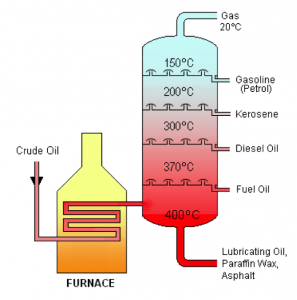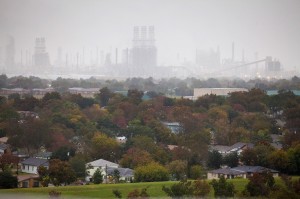Refinement Activities
After being removed from the Earth, crude oil is transported to a refinery where it is separated into different hydrocarbons present in crude oil. From there, various products can be made: jet fuel, plastic, tires, crayons, gasoline, asphalt, diesel fuel, kerosene, and more.
Crude oil is processed over millions of years by fossils breaking down deep beneath the earth’s surface. It is “crude” because it is unrefined–untouched until it has been pulled out by humans. They are made up of hydrocarbons, which are chemical compounds of hydrogen and carbon. The content of the hydrogen and carbon can vary, but they must be broken down in order to be used. Hydrocarbons are extremely versatile and full of energy, so they are useful to chemists. They are also useful in making all types of products useful to us every day. Hydrocarbons found in various types of crude oils include the following, with their more common chemical names:
- Paraffins: methane, ethane, propane, butane, isobutane, pentane, hexane
- Aromatics: benzene, napthalene
- Napthenes: cyclohexane, methyl cyclopentane
- Alkenes: ethylene, butene, isobutene
Crude oil contains hundreds of different hydrocarbons, so they must be broken down first. They are broken down by utilizing a distillation process. Boiling points for these hydrocarbons vary by type, so distillation separates them. As they boil, different types begin to vaporize, and the vapor is pulled out. Each type of hydrocarbon is useful to create different substances, so at oil refineries, they separate these different types to be used for different purposes. As a result of these products being made from hydrocarbons that boil and vaporize at different rates, all of the products will boil and vaporize at the same temperature as the hydrocarbons used to compose them.
The refineries are where items are actually made, such as gasoline, until they can be transported elsewhere. Refineries are also responsible for cleaning up any waste created by these products, which can be a dangerous job.

Valero Refinery in Houston, Texas, which releases 114,000 pounds of toxic air pollutants every year.
Critical Investigation: Why and How
The threats posed by oil refinement is twofold: environmental and social. Refineries pump tons of air pollutants into the atmosphere every year. That air and then breathed by humans, posing a threat not yet fully understood to all that breathe it in; however, it is known that breathing in these air pollutants, which include toxins like benzene, can cause leukemia. Those that live near these refineries also do not always know the risks of breathing in the air around them. Furthermore, many of these refineries do not properly dispose of their waste, contaminating the soil where food is grown. Those that eat the food can get sick. The longterm impacts of these toxins could be devastating to humans, the atmosphere (as we already see in the Ozone Layer depletion), animals, and our earth as we know it.

